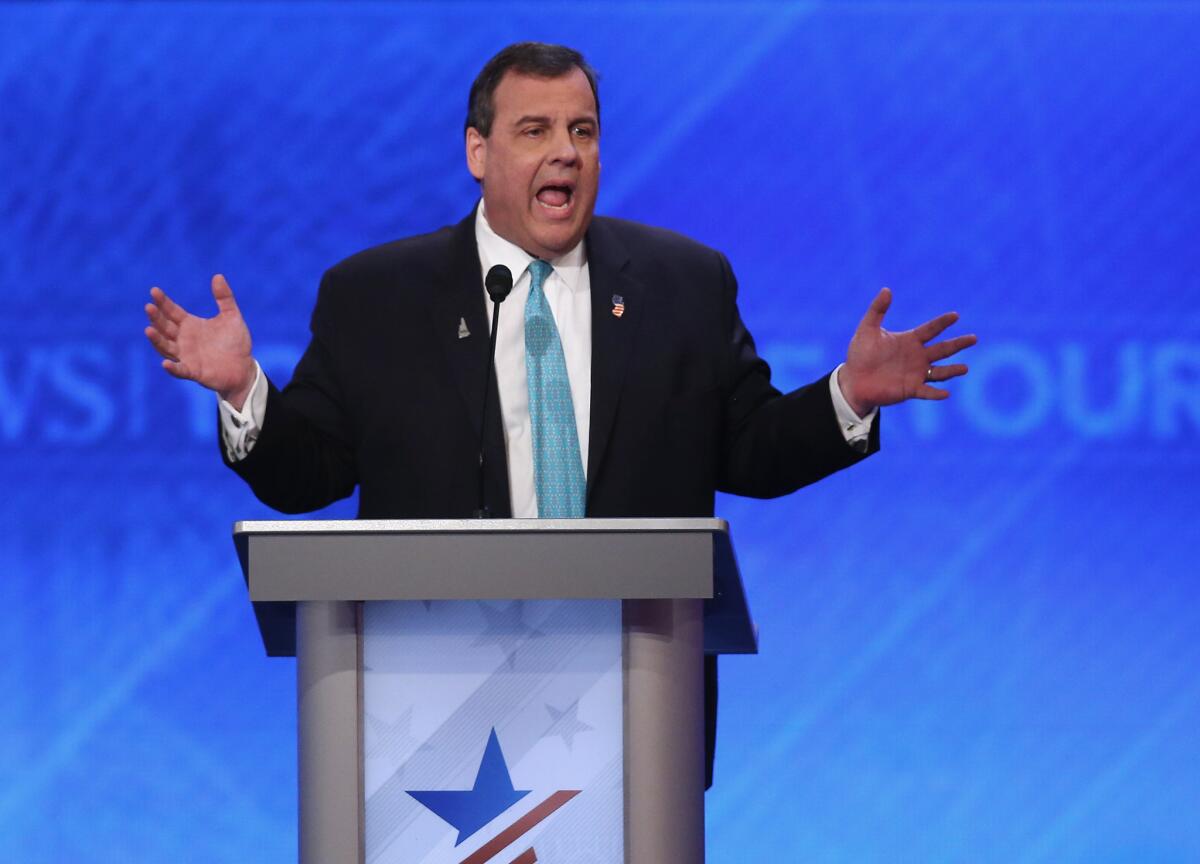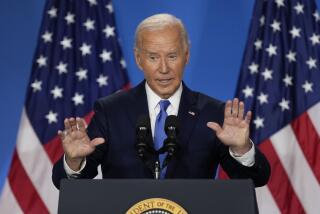Opinion: Chris Christie exits presidential race, leaving a question mark on Marco Rubio

New Jersey Gov. Chris Christie speaks at the Republican presidential debate in Manchester, N.H. He suspended his campaign after finishing sixth in the New Hampshire primary.
- Share via
New Jersey Gov. Chris Christie’s presidential bid apparently died in New Hampshire, which shows you there’s not much upside to performing well in the debates -- just a huge potential downside.
Sources told reporters Wednesday that the governor was suspending his campaign after his disappointing sixth-place finish in the Granite State, which wasn’t good enough to qualify him for the next GOP debate. The debates have been where Christie shined, but the same could be said for Carly Fiorina, who also dropped out of the race Wednesday after foundering at the ballot.
Christie’s best performance came at Saturday’s debate in Manchester, N.H., where he issued a sharp but fair critique of the hot Republican candidate of the moment, Sen. Marco Rubio -- someone who’d been articulate and fast on his feet at previous contests. Addressing Rubio directly, Christie launched into a 77-second riff on how Rubio’s lack of executive experience leaves him as unprepared for the White House as (shudder!) Barack Obama was.
“You have not been involved in a consequential decision where you had to be held accountable. You just simply haven’t,” Christie said. “The fact is, it does matter when you have to make decisions and be held accountable for them. It does matter when the challenges don’t come [in] a list [on] a piece of paper of what to vote yes or no [on] everyday, but when the problems come in from the people that you serve. “
As President George W. Bush memorably put it, the main job of the person in the Oval Office is to be ‘the decider.’ His voice isn’t just one of 100, it’s the final one.
That slap should have been easy to rebut; Abe Lincoln, the first and greatest Republican president, had been a legislator, not a governor. But Rubio called up the wrong canned response from the soundbite server in his brain, going off orthogonally on President Obama for the offense of not being clueless. Then, when Christie pressed him, Rubio went back to those same memorized lines again and again.
It was hard to watch, unless you’re the kind of person who likes to mark the precise point at which a campaign’s rocket booster disengages and falls to Earth.
Again, Christie’s point was a fair one. As President George W. Bush memorably put it, the main job of the person in the Oval Office is to be “the decider.” His voice isn’t just one of 100, it’s the final one. That takes an extra degree of fortitude, just as it takes character to hold oneself accountable for the consequences.
But it’s not enough to know that someone has made such decisions. More revealing is how a candidate handled that responsibility. Granted, the stakes are so much higher for a president, a candidate’s experience as governor or CEO might not provide enough of a clue. Just look at Bush, who was governor of Texas before ascending to the White House. The most consequential decision of his presidency was how to respond to the 9/11 attacks, an event far beyond anything he’d confronted in Austin. And, thanks at least in part to the advisors he surrounded himself with, we wound up in a quagmire in Afghanistan (which probably was inevitable, given that the U.S. couldn’t ignore the Taliban’s support for Al Qaeda) and a destructive misadventure in Iraq (which was completely avoidable).
And contrary to Christie’s jibe, Rubio has made at least one consequential decision as a senator: Putting a boatload of political capital at risk, he led efforts in the Senate to pass a comprehensive fix to the country’s broken immigration laws. That was a singular achievement. But as Jeb Bush has observed, Rubio backpedaled furiously from the legislation once the political winds turned and the increasingly tea party-infused GOP became more insistent on deporting all of the 11 mlllion-plus people who are in the country illegally.
Not that Christie is the model of accountability -- see, for example, “Bridgegate.” There’s also the impressive catalog the Newark Star-Ledger’s Tom Moran has compiled of the times Christie has failed to come clean about his actions and his plans. (“They all lie, and I get that. But Christie does it with such audacity, and such frequency, that he stands out,” Moran writes.)
Regardless, the exchange was telling. And by pushing Rubio’s buttons hard enough to make his articulate inner machine glitch, Christie caused the post-Iowa Marcomentum to go poof. Surges come and go in these races, and Rubio may certainly rise again. But he’ll need to find a better answer to the question about decision-making, even if Christie won’t be around to keep asking it.
Follow Healey’s intermittent Twitter feed: @jcahealey
More to Read
A cure for the common opinion
Get thought-provoking perspectives with our weekly newsletter.
You may occasionally receive promotional content from the Los Angeles Times.










